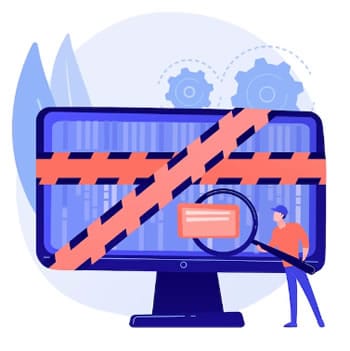Recovering Lost Data: What To Do When Your Files Have Gone Missing

Data loss is a common problem that most computer users experience. It could happen due to hardware failure, software malfunctions, virus attacks, or human error. When such an event occurs, it can be frustrating and even catastrophic if the data in question is critical. However, with the right approach, it is possible to recover lost data. In this article, we will discuss what to do when you lose data, what not to do, how to identify a data recovery company, how to prevent data loss in the future, how to backup data in the cloud, and a conclusion.
Causes of Data Loss
Data loss can occur for a variety of reasons. Here are some of the most common causes of data loss:
- Human error: Accidentally deleting files, formatting the wrong drive, or saving over an important document can all lead to data loss.
- Hardware failure: A hard drive or other storage device can fail due to mechanical or electrical problems, causing data loss.
- Software corruption: Software errors or viruses can corrupt files, rendering them inaccessible.
- Natural disasters: Floods, fires, and other natural disasters can destroy hardware and result in data loss.
What To Do When You Lose Data
The first thing you should do when you realize that you have lost data is to stop using the affected device immediately. Continuing to use the device could overwrite the lost data and make it impossible to recover. Next, you should try to identify the cause of the data loss. Was it due to a hardware failure, software malfunction, virus attack, or human error? This information is vital in determining the best approach to recovering the lost data.
If the cause of the data loss is a software issue, such as accidental deletion, you can try to recover the data using built-in recovery tools or third-party software. However, if the cause is a hardware failure or virus attack, you may need the services of a professional data recovery company.
What Not To Do When You Lose Data
When you lose data, it’s important not to panic or make hasty decisions that could worsen the situation. One of the worst things you could do is to continue using the affected device or attempt to recover the lost data yourself, especially if you don’t have the necessary knowledge or tools. You could overwrite the lost data, causing it to be permanently lost, or cause further damage to the device.
Another mistake people make when they lose data is to use recovery tools indiscriminately. Some of these tools could further damage the affected device or lead to the loss of more data. It’s important to do your research and choose a reliable data recovery tool or service provider.
How To Identify A Data Recovery Company
If you decide to use the services of a data recovery company, it’s important to choose a reputable and reliable provider. Here are some factors to consider when choosing a professional data recovery company:
- Experience: Look for a company that has been in the data recovery business for several years and has a track record of successfully recovering lost data.
- Expertise: Choose a company that has experience in dealing with the type of data loss you’ve experienced. For example, if the data loss was due to a physical hard drive failure, look for a company that specializes in physical data recovery.
- Confidentiality: Data recovery companies deal with sensitive information, so it’s important to choose a company that prioritizes confidentiality and data privacy.
- Cost: Data recovery services can be expensive, so choose a company that offers reasonable prices and has a transparent pricing policy.
How To Prevent Data Loss In The Future
Preventing data loss in the future requires a proactive approach. Here are some tips to help you protect your data:
- Regular backups: Back up your data regularly, and store the backups in a safe location, preferably off-site or in the cloud.
- Keep your software up-to-date: Update your software and operating system regularly to ensure that you have the latest security patches and bug fixes.
- Use antivirus software: Install and regularly update antivirus software to protect your device from malware and virus attacks.
- Be cautious when downloading or installing software: Only download and install software from reputable sources to avoid malware or virus infections.
How To Backup Data In The Cloud
Backing up your data in the cloud is a great way to ensure that your data is safe and secure. Here’s how to backup data in the cloud:
- Choose a cloud storage service: There are many cloud storage services available, such as Google Drive, Dropbox, OneDrive, and iCloud. Choose one that fits your needs and budget.
- Create an account: Once you’ve chosen a cloud storage service, create an account and sign in.
- Install the cloud storage application: Most cloud storage services offer desktop and mobile applications that can be installed on your devices. Install the application and sign in.
- Select the files you want to backup: Once the cloud storage application is installed, select the files and folders you want to backup. You can do this by dragging and dropping the files into the cloud storage folder on your device, or by selecting the files in the application.
- Enable automatic backups: To ensure that your data is always backed up, enable automatic backups. This will automatically upload any new or modified files to the cloud storage service.
- Set backup preferences: Most cloud storage services allow you to set backup preferences, such as how often backups should occur, and which files or folders should be included in the backup.
- Check backup status: Once you’ve set up your backup preferences, regularly check the backup status to ensure that your data is being backed up properly. Most cloud storage services provide a backup status report that shows which files have been backed up and which ones are pending backup.
Backing up your data in the cloud is an easy and effective way to ensure that your data is safe and secure. By following these steps, you can backup your data in the cloud and have peace of mind knowing that your data is always protected
Conclusion
Losing important data can be a frustrating and stressful experience, but there are steps you can take to prevent data loss and recover lost files. By taking precautions like backing up your data and being cautious with emails and downloads, you can help protect your data from loss. If you do experience data loss, don’t panic. Try using a data recovery tool and, if necessary, contact a data recovery specialist such as East Africa Hi Tech Solutions for help. With the right approach, you can often recover lost data and avoid a data disaster







